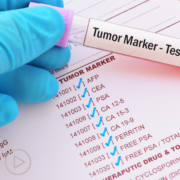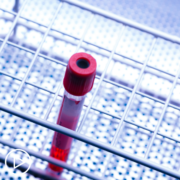How Do Biomarker Test Results Impact a Gastric Cancer Treatment Plan?
How Do Biomarker Test Results Impact a Gastric Cancer Treatment Plan? from Patient Empowerment Network on Vimeo.
What impact do biomarker test results have on gastric cancer care? Expert Dr. Matthew Strickland explains how the identification of biomarkers affect treatment choices and why patients should insist on this essential testing.
Dr. Matthew Strickland is a medical oncologist at Massachusetts General Hospital. Learn more about Dr. Strickland.
See More From INSIST! Gastric Cancer
Related Programs:

|

|

|
Transcript:
Katherine Banwell:
Dr. Strickland, how do biomarker test results impact gastric cancer prognosis?
Dr. Matthew Strickland:
So, biomarkers will directly guide our treatment decisions in how we can assemble the best treatment plan for our patient as an individual. That will have direct ramifications for how well and for how long that therapy can work for.
So, I would say that there’s a direct correlation between the biomarker analysis to prognosis.
Katherine Banwell:
Dr. Strickland, how do biomarker test results impact gastric cancer treatment options?
Dr. Matthew Strickland:
So, for example, depending on the stage…if a patient has a stage IV cancer, PD-L1 expression will guide our treatment decision whether to include immunotherapy typically with a chemotherapy background or not. To say that a different way, if the expression is very low or absent, we know that patient likely will not benefit from immunotherapy and could actually be harmed, because there is some toxicity that comes with these treatments. That’s one example. But similarly for HER2+ patients, we’ll similarly assemble a treatment regimen with a targeted therapy that is included.
That certainly guides treatment options, specifically based on a HER2-positive result or negative. The next biomarker I want everyone to know about is called PD-L1. That stands for programmed death ligand 1. This is also a protein that’s expressed on the surface of cancer cells.
That usually leads to a better outcome than for patients that we can’t include a targeted therapy and left relying on chemotherapy only.
Katherine Banwell:
Dr. Strickland, what questions should patients ask their healthcare team about testing and test results?
Dr. Matthew Strickland:
Because biomarker status is so critical for treatment decisions and leading to outcomes and prognosis, I would encourage patients to ask their provider if all standard biomarkers have been obtained at the time of their diagnosis. Sometimes that answer is no, but they’re working on it. That’s okay. But I would highly encourage patients to just ensure that standard biomarkers are being tested for, that they will directly guide the treatment recommendations.
Katherine Banwell:
Dr. Strickland, is there developing research or treatment news that gastric cancer patients should know about?
Dr. Matthew Strickland:
I think it’s a very exciting time for the treatment of gastric cancer. Now, we still have a lot of work to do. I don’t want to minimize. This is still a tough and can be an aggressive cancer. It’s no time to let up.
That being said, if we use immunotherapy as an example alone, there’s been a flurry of new approvals for standard of care in the last three to four years. Our understanding is only increasing of how to select the right patients that will benefit as well as how to avoid some of the toxicities. Beyond immunotherapy, there are new and emerging targets that we can design targeted therapy for.
We don’t yet have mainstream approvals for targets like Claudin 18.2. But this is a very exciting new target that I think will lead to an approval in the short future.










